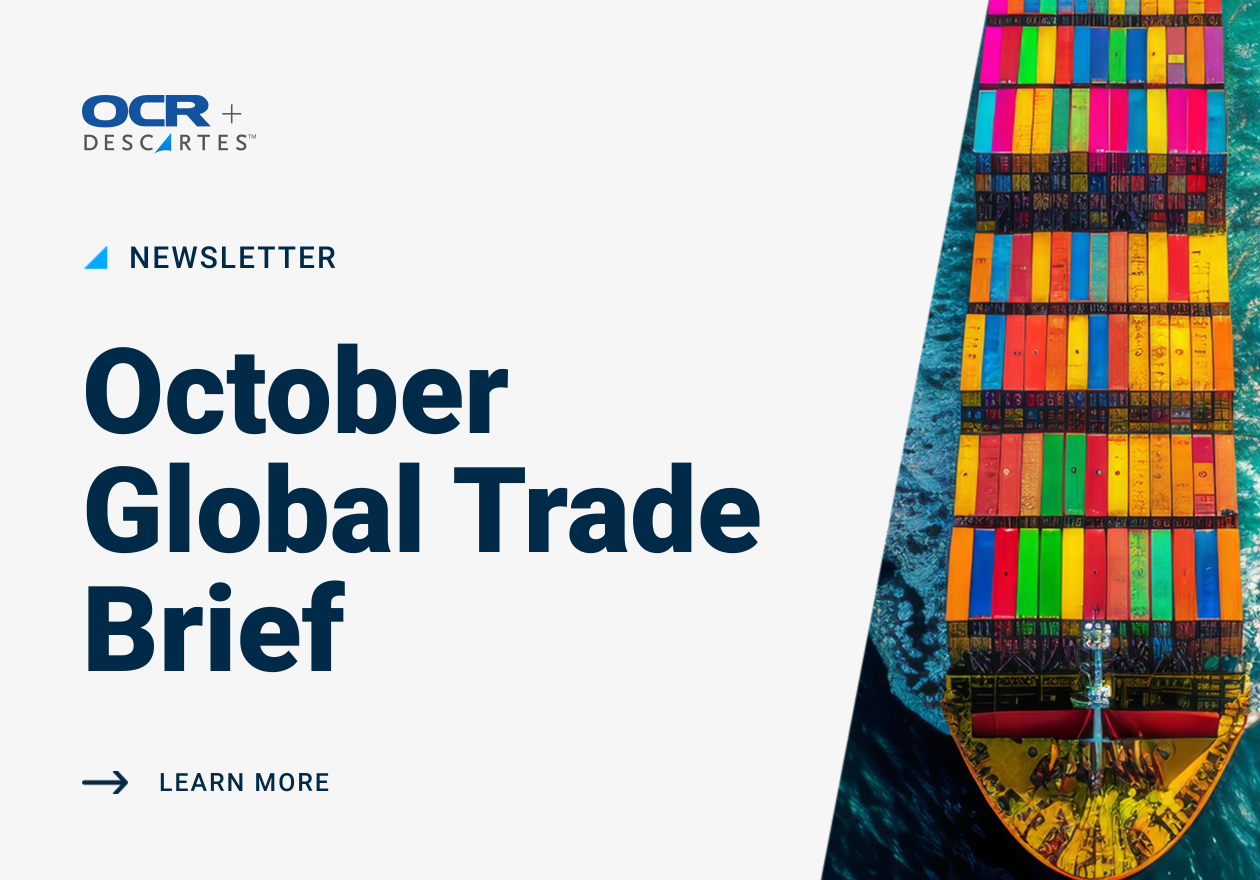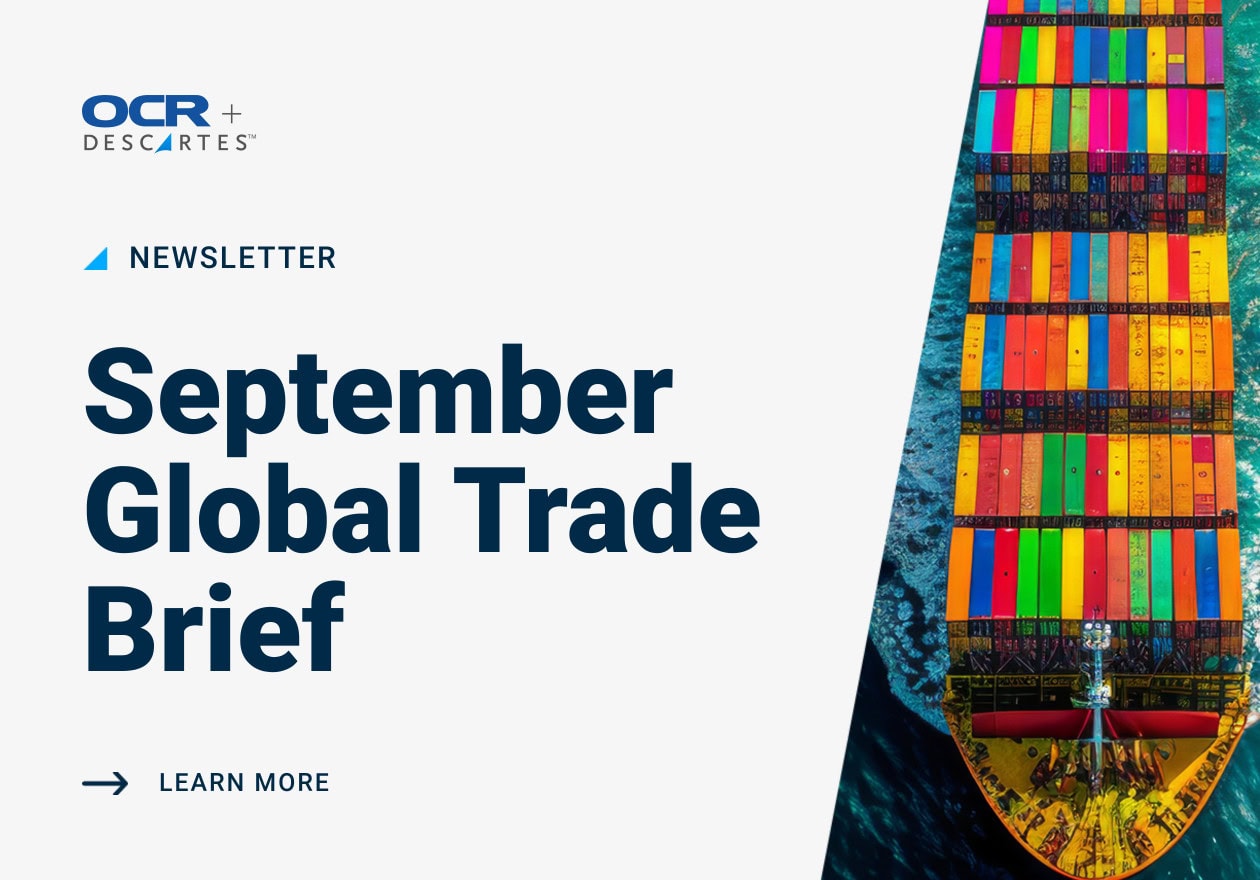U.S. continuation of Section 301 tariffs on imports from China
USTR announced the first step in the statutory four-year review process of the two actions, as modified, taken under Section 301 in the investigation of China’s Acts, Policies, and Practices Related to Technology Transfer, Intellectual Property, and Innovation.
The notice informed representatives of domestic industries which benefit from the actions, as modified, of the possible termination of the actions and of the opportunity for the representatives to request continuation of the actions.
USTR received requests for continuation of both actions from representatives of domestic industries which benefit from the actions. Accordingly, the tariffs did not expire on their four-year anniversary dates and USTR will proceed with the next steps as provided in the statute.
Source: https://ustr.gov/sites/default/files/2022-09/4-Year%20Review%20FRN%20090222.pdf
CBP Modifies Withhold Release Order on Natchi Apparel (P) Ltd.
U.S. Customs and Border Protection has modified the Withhold Release Order (WRO) against Natchi Apparel (P) Ltd. garment imports. Effective immediately, provided the imports are otherwise in compliance with U.S. law, Natchi Apparel (P) Ltd. shipments will be allowed to enter U.S. commerce. Shipments that have previously been detained will also be released.
This modification takes place a month after CBP issued the WRO on July 29, 2022, representing swift and successful collaboration between civil society and worker rights organizations, Natchi Apparel (P) Ltd. and its parent company Eastman Exports, and CBP. This collaboration plays a critical role in ensuring that imports entering the United States are free of forced labor and meet the humane and ethical standards required by U.S. customs and trade laws. It improves American economic security while upholding human rights for workers.
CBP lifted the WRO after a non-governmental organization, Eastman Exports, and Natchi Apparel (P) Ltd. provided evidence to CBP that Natchi Apparel (P) Ltd., located in India, had addressed all five of the International Labour Organization’s indicators of forced labor identified by the WRO.
U.S. publication of 14 general licenses related to Russia
The Department of the Treasury’s Office of Foreign Assets Control (OFAC) published general licenses (GLs) issued in the Russian Harmful Foreign Activities Sanctions Regulations:
General License No. 38A—Authorizing transactions related to pension payments
General License No. 50—Authorizing the closing of individual accounts at financial institutions blocked pursuant to Executive Order 14024
General License No. 40A—Civil aviation safety
General License No. 43A—Divestment or transfer of debt or equity of, and wind down of derivative contracts involving, public joint stock company Severstal or Nord Gold PLC
General License No. 47—Authorizing the wind down of transactions involving certain entities blocked on August 2, 2022
General License No. 48—Divestment or transfer of debt or equity of, and wind down of derivative contracts involving, certain entities blocked on August 2, 2022
General License No. 49—Authorizing the wind down of transactions involving MMK
General License No. 40B—Civil aviation safety
General License No. 47A—Authorizing the wind down of transactions involving certain entities blocked on August 2, 2022
General License No. 48A—Divestment or transfer of debt or equity of, and wind down of derivative contracts involving, certain entities blocked on August 2, 2022
General License No. 8—Authorizing transactions related to energy
General License No. 8A—Authorizing transactions related to energy
General License No. 8B—Authorizing transactions related to energy
General License No. 8C—Authorizing transactions related to energy
Source: https://public-inspection.federalregister.gov/2022-19313.pdf
https://public-inspection.federalregister.gov/2022-19311.pdf
https://public-inspection.federalregister.gov/2022-19443.pdf
https://public-inspection.federalregister.gov/2022-19312.pdf
Authorization of Certain “Items” to Entities on the Entity List in the Context of Specific Standards Activities
In this interim final rule, the Bureau of Industry and Security (BIS) amends the Export Administration Regulations (EAR) to authorize the release of specified items subject to the
EAR without a license when that release occurs in the context of a “standards-related activity,” as defined in this rule. BIS is revising the terms used in the EAR to describe the actions permissible under the authorization rather than defining the organizations to which it applies. The scope of the authorization is revised to include certain “technology” as well as “software” and applies to all entities listed on BIS’s Entity List. The uncertainty of not knowing whether other entities listed on the Entity List are participants in standards organizations and whether a BIS license is required to release low-level technology for legitimate standards activities has caused U.S. companies to limit their participation in standards-related activities in areas that are critical to U.S. national security.
This authorization only overcomes licensing requirements imposed as a result of an entity’s inclusion on the Entity List; other EAR licensing requirements, including additional end-use or end-user based licensing requirements may continue to apply. This final rule does not change the assessment of whether “technology” or “software” is subject to the EAR. BIS is making these revisions to ensure that export controls and associated compliance concerns as they relate to the Entity List do not impede the leadership and participation of U.S. companies in national and international standards-related activities
Source: https://public-inspection.federalregister.gov/2022-19415.pdf
Preliminary Guidance on Implementation of a Maritime Services Policy and Related Price Exception for Seaborne Russian Oil
As part of a coalition of countries including the G7 and the EU, the United States will implement a policy with regards to a broad range of services related to the maritime transportation (the “maritime services policy”) of Russian Federation origin crude oil and petroleum products (“seaborne Russian oil”). This ban will take effect on December 5, 2022 with respect to maritime transportation of crude oil and on February 5, 2023 with respect to maritime transportation of petroleum products.
This policy, constructed as a ban on services, will have an important exception: jurisdictions or actors that purchase seaborne Russian oil at or below a price cap to be established by the coalition (the “price exception”) will expressly be able to receive such services. This policy is intended to expressly establish a framework for Russian oil to be exported by sea under a capped price and achieve three objectives: (i) maintain a reliable supply of seaborne Russian oil to the global market; (ii) reduce upward pressure on energy prices; and (iii) reduce the revenues the Russian Federation earns from oil after its own war of choice in Ukraine has inflated global energy prices.
Source:https://home.treasury.gov/system/files/126/cap_guidance_20220909.pdf
Commission moves to ban products made with forced labor on the EU market
The Commission has today proposed to prohibit products made with forced labor on the EU market. The proposal covers all products, namely those made in the EU for domestic consumption and exports, and imported goods, without targeting specific companies or industries. This comprehensive approach is important because an estimated 27.6 million people are in forced labor, in many industries and in every continent. The majority of forced labor takes place in the private economy, while some is imposed by States. The proposal builds on internationally agreed definitions and standards, and underlines the importance of close cooperation with global partners. National authorities will be empowered to withdraw from the EU market products made with forced labor, following an investigation. EU customs authorities will identify and stop products made with forced labor at EU borders.
Technical Correction to the Harmonized Tariff Schedule of the United States
In Presidential Proclamation 9072 of December 23, 2013 (78 FR 80415), the President designated Curaçao as a beneficiary country for purposes of the Caribbean Basin Economic Recovery Act (CBERA) and the Caribbean Basin Trade Partnership Act (Title II of the Trade and Development Act of 2000, Pub. L. 106–200) (CBTPA). In that Proclamation, the President also delegated authority to the U.S. Trade Representative to determine if Curaçao is meeting the customs criteria of the CBERA. In August 2015, USTR published a notice in the Federal Register (80 FR 51650) announcing the U.S. Trade Representative’s determination that Curaçao met the CBERA customs criteria and USTR therefore was modifying general note 17(a) and U.S. note 1 to subchapter XX of chapter 98 of the HTSUS. The August 2015 notice omitted a modification to U.S. note 7(b) to subchapter II of chapter 98 of the HTSUS.
- Technical Corrections Presidential Proclamation 6969 of January 27, 1997 (62 FR 4415), authorizes the U.S. Trade Representative to exercise the authority provided to the President under section 604 of the Trade Act of 1974 (19 U.S.C. 2483) to embody rectifications, technical or conforming changes, or similar modifications in the HTSUS. Pursuant to this delegated authority, the U.S. Trade Representative is modifying the HTSUS to correct to 2015 omission and make the following technical changes:
Effective with respect to articles entered, or withdrawn from warehouse for consumption, on or after the effective date of this notice, U.S. note 7(b) to subchapter II of chapter 98 of the Harmonized Tariff Schedule of the United States (HTSUS) is modified by inserting in alphabetical sequence in the list of eligible CBTPA beneficiary countries “Curaçao.”
Source: https://www.govinfo.gov/content/pkg/FR-2022-09-22/html/2022-20477.htm


